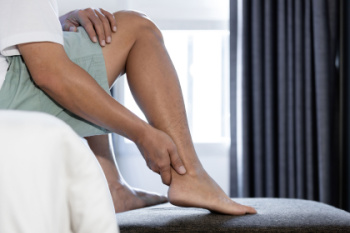
An Achilles tendon injury can be painful and limiting, affecting your ability to walk, run, or engage in daily activities. This strong tendon connects the calf muscles to the heel and plays a vital role in movements like walking, jumping, and climbing stairs. Achilles tendinitis, often caused by overuse, results in stiffness and pain in the back of the heel, which can worsen with activity. If left untreated, this condition can progress to Achilles tendinosis, leading to further degeneration of the tendon. In severe cases, an Achilles tendon rupture may occur, causing sudden, sharp pain and making it difficult to walk. While treatment options vary based on the severity of the Achilles tendon injury, a podiatrist can provide both non-surgical and surgical solutions tailored to your needs. These may include targeted exercises, custom orthotics, or surgery to repair a ruptured tendon. If you have incurred an Achilles tendon injury, it is suggested that you schedule an appointment with a podiatrist for a diagnosis and treatment.
Achilles tendon injuries need immediate attention to avoid future complications. If you have any concerns, contact Jack A. Sasiene, DPM of Texas. Our doctor can provide the care you need to keep you pain-free and on your feet.
What Is the Achilles Tendon?
The Achilles tendon is a tendon that connects the lower leg muscles and calf to the heel of the foot. It is the strongest tendon in the human body and is essential for making movement possible. Because this tendon is such an integral part of the body, any injuries to it can create immense difficulties and should immediately be presented to a doctor.
What Are the Symptoms of an Achilles Tendon Injury?
There are various types of injuries that can affect the Achilles tendon. The two most common injuries are Achilles tendinitis and ruptures of the tendon.
Achilles Tendinitis Symptoms
- Inflammation
- Dull to severe pain
- Increased blood flow to the tendon
- Thickening of the tendon
Rupture Symptoms
- Extreme pain and swelling in the foot
- Total immobility
Treatment and Prevention
Achilles tendon injuries are diagnosed by a thorough physical evaluation, which can include an MRI. Treatment involves rest, physical therapy, and in some cases, surgery. However, various preventative measures can be taken to avoid these injuries, such as:
- Thorough stretching of the tendon before and after exercise
- Strengthening exercises like calf raises, squats, leg curls, leg extensions, leg raises, lunges, and leg presses
If you have any questions please feel free to contact our office located in Lake Jackson, TX . We offer the newest diagnostic tools and technology to treat your foot and ankle needs.
